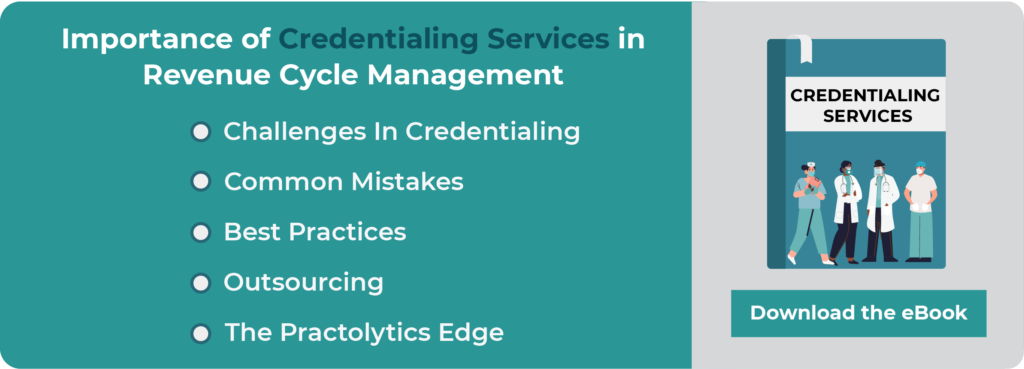Top 10 Challenges in Healthcare Credentialing
Credentialing services is a cornerstone of healthcare administration. It ensures that providers meet the necessary qualifications, follow payer standards. Also, providers need to maintain regulatory requirements. Healthcare credentialing, though vital for reimbursements and patient confidence, often hinders operations. This intricate process poses challenges, disrupting workflows and creating financial hurdles. Credentialing is vital. But, it is complex and time-consuming. This often disrupts healthcare delivery and harms financial stability.
Medical groups and billing firms must grasp these hurdles. It’s crucial to overcome them. We will examine the top 10 challenges in healthcare credentialing in this blog. Also, we tend to offer actionable solutions to navigate these issues effectively.
Table of Contents
Top 10 Challenges
1. Managing Complex Documentation
Credentialing requires gathering, verifying, and maintaining an extensive range of documents, including:
- Provider licenses.
- Board certifications.
- Work history and malpractice insurance.
It gets overwhelming with multiple providers and payers, each with unique requirements. Missing or outdated documents can result in delays or rejections.
Solution: Implement a centralized digital repository to store and update all provider credentials. Automating reminders for renewals or expiring documents can prevent unnecessary delays.
2.Navigating Payer-Specific Requirements
Each payer has its own credentialing criteria and timelines. Thus, making it challenging to standardize processes. Submitting incomplete or incorrect information to payers can lead to application rejections.
Solution: Leverage technology to maintain a database of payer-specific requirements. Automating compliance checks can ensure applications meet each payer’s criteria before submission. Outsourcing credentialing to experts familiar with payer protocols can save time.
3. Lengthy Processing Times
Incredibly time-consuming is credentialing. It often takes 90 to 120 days or even more for the completion. Payer approval delays can obstruct provider onboarding, potentially disrupting patient care.
Solution: Adopt credentialing management software to track application statuses and follow up proactively. Partnering with credentialing specialists who have established payer relationships can expedite the process.
4.Data Entry Errors and Inconsistencies
Entering the provider data manually raises the risk of errors. This includes mismatched names, wrong dates, and incomplete applications. Such errors can cause rejections and further delays.
Solution: Use credentialing software to automate data entry. It must integrate with provider databases and payer systems. To find and fix inconsistencies early in the process, conduct routine audits.
5. Keeping Up with Renewals and Deadlines
Regular renewals are required for provider qualifications, including licenses, certificates, and malpractice insurance. A provider’s privileges may be suspended if they miss a renewal date. It can also cause revenue loss.
Solution: Set up automated alerts and reminders for upcoming renewals. Assign a team or outsourcing partner to manage all credentialing timelines.
6.Difficulty Tracking Application Status
With multiple applications to various payers, tracking their status can be hard. A lack of visibility into an application’s status can cause delays and miscommunication.
Solution: Use a credentialing management platform. It should track and update each application in real-time. This transparency enables proactive follow-ups with payers and prevents missed opportunities.
7.Managing High Volumes of Providers
Scaling credentialing for larger organizations or billing firms is daunting. They handle multiple practices. As provider numbers rise, manual processes can’t keep up. This causes errors and inefficiencies.
Solution: Adopt scalable credentialing software capable of handling high volumes. Automating tasks like data entry and verifications can cut admin work.
8.Regulatory and Compliance Risks
Strict federal, state, and payer standards must be adhered to when credentialing healthcare professionals. Penalties, contract termination, and reputational harm may follow noncompliance.
Solution: Stay informed about changing regulations and payer rules. Outsourcing credentialing to experts ensures compliance. It reduces legal risks.
9.High Costs of Manual Processes
Medical Credentialing Services is labor-intensive when handled manually, consuming significant staff time and resources. This results in hidden costs from inefficiencies, application errors, and delayed reimbursements.
Solution: Invest in automation tools. They will cut manual work. Then, reassign staff to higher-value tasks. Outsourcing credentialing to an expert can cut costs and boost efficiency.
10.Lack of Credentialing Expertise
Many healthcare organizations and billing firms can’t navigate the complexities of credentialing. They lack the know-how. Poor process management can lead to denied applications, compliance risks, and lost revenue.
Solution: Partner with a credentialing service like Practolytics for their expertise. Credentialing teams can manage the entire process. This includes document collection and payer enrollment. They ensure accuracy and efficiency.
How Practolytics Simplifies Credentialing for Healthcare Organizations
At Practolytics, we know healthcare credentialing is hard. We offer custom solutions to streamline the process. Our services include:
- End-to-end credentialing management for individual providers and groups.
- Automated tracking and updates for renewals and applications.
- Expertise in payer-specific requirements and compliance standards.
- Scalable solutions designed to handle high volumes efficiently.
Our tools and team help healthcare groups focus on patients. We ensure the accuracy, timeliness, and compliance of their credentials.
Advantages of Overcoming Credentialing Issues
Healthcare organizations can accomplish the following by proactively addressing credentialing issues:
- Faster Provider Onboarding: Make sure providers can begin billing sooner by cutting down on processing delays.
- Better Cash Flow: Prevent credentialing-related reimbursement delays.
- Reduce the possibility of fines or audits with enhanced compliance.
- Increase operational efficiency by allocating staff time and resources to essential duties.
- Patient Trust: Maintain high standards of care with verified and qualified providers.
Conclusion:
Healthcare credentialing is a tough but vital process. It affects both financial performance and patient care. Addressing the top challenges can boost efficiency and revenue. These include managing documents, meeting payer requirements, and reducing processing times.
With the right tools, healthcare organizations can use automation to overcome these hurdles. They can then create a compliant, streamlined credentialing process. Partnering with an expert like Practolytics ensures fast, reliable credentialing.
Ready to simplify your credentialing process? Contact Practolytics today. We can help optimize your credentialing. Then, focus on what matters—delivering exceptional healthcare.
ALSO READ – 2023: New Changes and Updates in ICD-10 CM Codes
Talk to Medical Billing Expert Today — Get a Free Demo Now!






